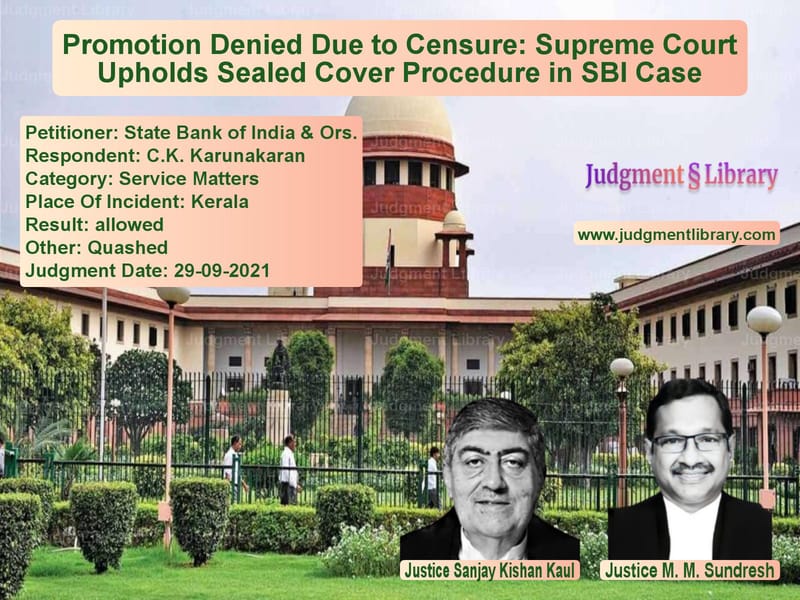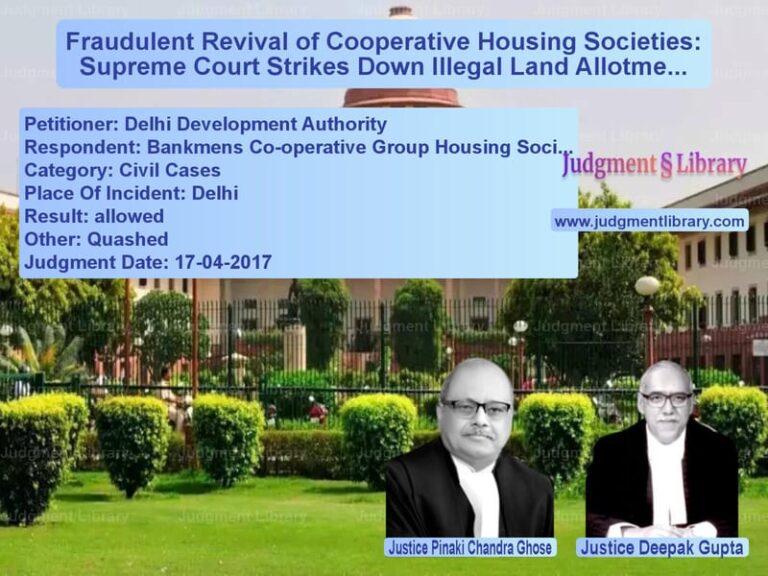Promotion Denied Due to Censure: Supreme Court Upholds Sealed Cover Procedure in SBI Case
The case of State Bank of India & Ors. v. C.K. Karunakaran revolves around the application of the sealed cover procedure in employee promotions when disciplinary proceedings are pending. The Supreme Court had to determine whether an employee who was placed under a sealed cover due to pending disciplinary action could be granted retrospective promotion after receiving a minor penalty of censure.
Background of the Case
The respondent, C.K. Karunakaran, was employed with the State Bank of India (SBI) in the Middle Management Grade Scale-II. His promotion to Middle Management Grade Scale-III came up for consideration in November 1984. However, at the time, disciplinary proceedings were initiated against him on January 28, 1985, before the final decision on his promotion could be made. The charge sheet was issued on November 4, 1985.
As per SBI’s promotion rules, when disciplinary proceedings are pending against an employee, their promotion is kept in a sealed cover. Following the conclusion of the inquiry, the respondent was awarded a minor penalty of censure on July 28, 1987. Due to this penalty, the sealed cover was not acted upon, and the respondent’s promotion was denied.
The respondent appealed to the departmental appellate authority, which dismissed his appeal on December 13, 1988. In 1992, he filed a writ petition in the Kerala High Court, challenging SBI’s decision and seeking promotion from the original due date. The High Court ruled in his favor, stating that the censure should not have affected his promotion. SBI then appealed to the Supreme Court.
Key Legal Issues
The Supreme Court had to determine:
- Whether the sealed cover procedure was correctly applied to the respondent’s case.
- Whether a minor penalty of censure should have impacted his promotion.
- Whether the Kerala High Court was correct in granting retrospective promotion.
Arguments by the Petitioner (State Bank of India)
SBI, represented by legal counsel, argued:
- The sealed cover procedure was applied correctly as per bank policies and service rules.
- As per Clause (iv) of SBI’s Staff Circular No.118, if an employee receives a penalty like censure, the findings of the sealed cover cannot be given effect.
- The respondent was considered for promotion in the next promotion cycle, in line with the bank’s internal rules.
- Judicial precedents, including State of M.P. v. I.A. Qureshi (1998) and Union of India v. A.N. Mohanan (2007), establish that even a minor penalty like censure can prevent an employee from being promoted based on a sealed cover evaluation.
Arguments by the Respondent (C.K. Karunakaran)
The respondent countered:
- The censure was a minor penalty and should not have affected his eligibility for promotion.
- By keeping his promotion in a sealed cover, the bank unfairly penalized him twice.
- Since he was eventually promoted in a later cycle, his original promotion should have been granted retrospectively.
- The Kerala High Court correctly ruled that the bank’s decision was unfair and arbitrary.
Supreme Court’s Observations
After reviewing the facts and legal precedents, the Supreme Court made the following observations:
- The sealed cover procedure was correctly applied as per SBI’s promotion rules and policies.
- As per Clause (iv) of SBI’s promotion rules, an employee facing censure is not eligible for promotion based on a prior sealed cover evaluation.
- Judicial precedents confirm that even minor penalties like censure can prevent an employee from being promoted retrospectively.
- The Kerala High Court’s ruling was incorrect because it ignored the established sealed cover policy.
Supreme Court’s Judgment
The Supreme Court ruled in favor of SBI, holding that:
- The application of the sealed cover procedure was justified.
- The respondent was correctly denied retrospective promotion due to the penalty of censure.
- The Kerala High Court’s ruling was set aside.
Key Takeaways from the Judgment
- Sealed Cover Procedure is Valid: The Court upheld the use of sealed cover promotions for employees facing disciplinary action.
- Minor Penalties Affect Promotions: Even a censure can impact an employee’s chances of promotion under established rules.
- Judicial Precedents Affirm SBI’s Actions: Previous rulings support the idea that penalties prevent retrospective promotions.
- Courts Should Not Override Service Rules: The ruling reinforces that courts must adhere to established employment policies.
- Promotions Must Follow Internal Guidelines: Employees cannot claim retrospective benefits if they have been penalized in any way.
Conclusion
The Supreme Court’s judgment in State Bank of India & Ors. v. C.K. Karunakaran sets an important precedent on the application of the sealed cover procedure in promotions. It confirms that even minor penalties like censure can impact an employee’s career progression. The ruling reinforces the importance of adhering to service rules and ensures that employees facing disciplinary action are not unfairly rewarded. This decision serves as a guiding principle for organizations implementing sealed cover promotions in disciplinary cases.
Petitioner Name: State Bank of India & Ors..Respondent Name: C.K. Karunakaran.Judgment By: Justice Sanjay Kishan Kaul, Justice M. M. Sundresh.Place Of Incident: Kerala.Judgment Date: 29-09-2021.
Don’t miss out on the full details! Download the complete judgment in PDF format below and gain valuable insights instantly!
Download Judgment: state-bank-of-india-vs-c.k.-karunakaran-supreme-court-of-india-judgment-dated-29-09-2021.pdf
Directly Download Judgment: Directly download this Judgment
See all petitions in Employment Disputes
See all petitions in Promotion Cases
See all petitions in Public Sector Employees
See all petitions in Judgment by Sanjay Kishan Kaul
See all petitions in Judgment by M.M. Sundresh
See all petitions in allowed
See all petitions in Quashed
See all petitions in supreme court of India judgments September 2021
See all petitions in 2021 judgments
See all posts in Service Matters Category
See all allowed petitions in Service Matters Category
See all Dismissed petitions in Service Matters Category
See all partially allowed petitions in Service Matters Category







